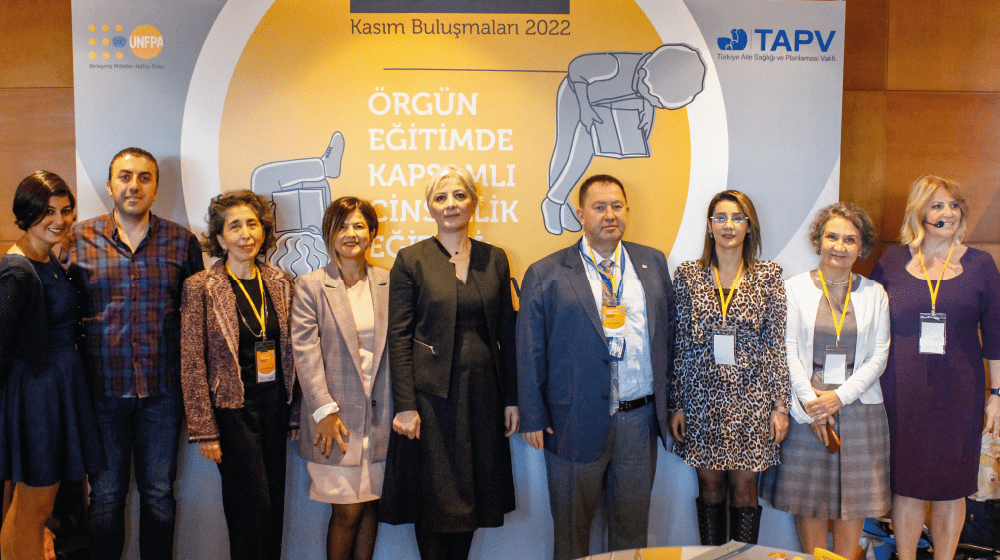The compulsory education curriculum meets only one-fifth of the United Nations' universal standards for sexual health education. This striking data is from the report “Analysis of Curriculums and Textbooks from Pre-School to Secondary Education in the Context of Age-Appropriate Comprehensive Sexuality Education” of the United Nations Population Fund (UNFPA) and the Family Health and Planning Foundation of Türkiye (TAPV). UNFPA and TAPV shared the most comprehensive sexual health education research ever conducted in Türkiye with the public.
5 November 2022
ISTANBUL, TÜRKİYE- The study “Analysis of Curriculums and Textbooks from Pre-School to Secondary Education in the Context of Age-Appropriate Comprehensive Sexuality Education” which was conducted to examine the basic concepts of comprehensive sexuality education, areas of need, topics that should be added to the curriculum, learning objectives and the situation in Türkiye's formal education curriculum, in order to support the well-being and potential of children and adolescents from pre-school to high school is completed.
The launch of the research report; “Comprehensive Sexuality Education in Formal Education: Boundaries and Results”, was held on Saturday, November 5, at 10:00 am, moderated by journalist Ahu Özyurt and with the participation of TAPV General Coordinator Nurcan Müftüoğlu, UNFPA Türkiye Sexual and Reproductive Health Coordinator Dr. Gökhan Yıldırımkaya and the Ministry of National Education officials. Students, teachers, psychological counselors, representatives of the public, private sector, civil society, academia, and international organizations also came together at the event where Ankara University faculty member Prof. Dr. Fatma Bıkmaz presented the report.
At the launch of the report, which underlined the purpose and importance of sexual health education, it was emphasized that “age-appropriate sexual health education”, which means empowering children and youth with an age-appropriate approach to teaching about sexuality and relationships, by providing scientifically accurate, realistic and non-judgmental information, should be added to the formal education curriculum, by highlighting the following data.
- 1out of every 2 women has no control over their body.
- 1 in 3 women and girls is exposed to violence.
- 1 in 5 children is married at a young age.
- 1 out of every 3 girls who are married at an early age also becomes a mother at an early age.
- Every year, 3 million girls have unsafe abortions due to unwanted pregnancies.
- One in three young people does not know how to protect themselves from sexually transmitted infections.
- One-third of newly diagnosed HIV-positive people are young people.
- Two out of three girls have no idea what a period is.
Türkiye ranks 124th out of 146 countries in the World Economic Forum's Gender Inequality Ranking. Experts believe that one of the most important reasons for this is the exclusion of age-appropriate comprehensive sexual health education in the curriculum.
According to the report of UNFPA and TAPV; understanding gender, sexuality, and sexual behavior, and sexual and reproductive health are the least covered topics in formal education curricula in Türkiye. For this reason, the compulsory education curriculum in Türkiye can only meet one-fifth of the United Nations' universal standards for sexual health education.
At the launch of the report; it was pointed out that the basic concepts of sexual health should be included in the curriculum in accordance with their age groups in order to raise individuals who are aware of their own body and development, who know and protect their rights, who can distinguish between safe and unsafe behaviors, who can say no when necessary, and who can develop healthy and respectful relationships.
At the event, the benefits of comprehensive sexual health education which were also underlined in the report were highlighted.
- It strengthens gender equality and supports the fight against violence.
- It increases the power to decide on one's own body and safe sexual behaviors.
- It supports the prevention of unwanted pregnancies and unsafe abortions.
- It contributes to the reduction of sexually transmitted infections such as HIV.
In the launch event, which also includes quotations from the recommendation part of the report, it was emphasized that the subjects of Gender, Human Body and Development, Sexuality and Sexual Behavior, and Sexual and Reproductive Health should be among the main topics to be covered in all related courses such as Guidance Hours, Science, Sports, Health Information and Traffic Culture and Biology.
Related links:
Sexual Health Education Animation Video (A visual summary of the report)
Live Stream Recording of the Event
About UNFPA:
UNFPA; United Nations Population Fund, is the sexual and reproductive health agency of the United Nations, which carries out programs to reach a world where every pregnancy is a wanted, every birth is safe and every young person can reach their full potential. UNFPA conducts studies in the fields of sexual and reproductive health, gender-based violence and population dynamics in order to ensure that women and young people have equal rights and opportunities to lead healthy and productive lives.
For news and interview requests;
Zeynep Atılgan - atilganozgenc@unfpa.org - +90 555 230 38 29
Why is #SexualHealthEducation is needed? Why Should It Be Added to the Curriculum?


